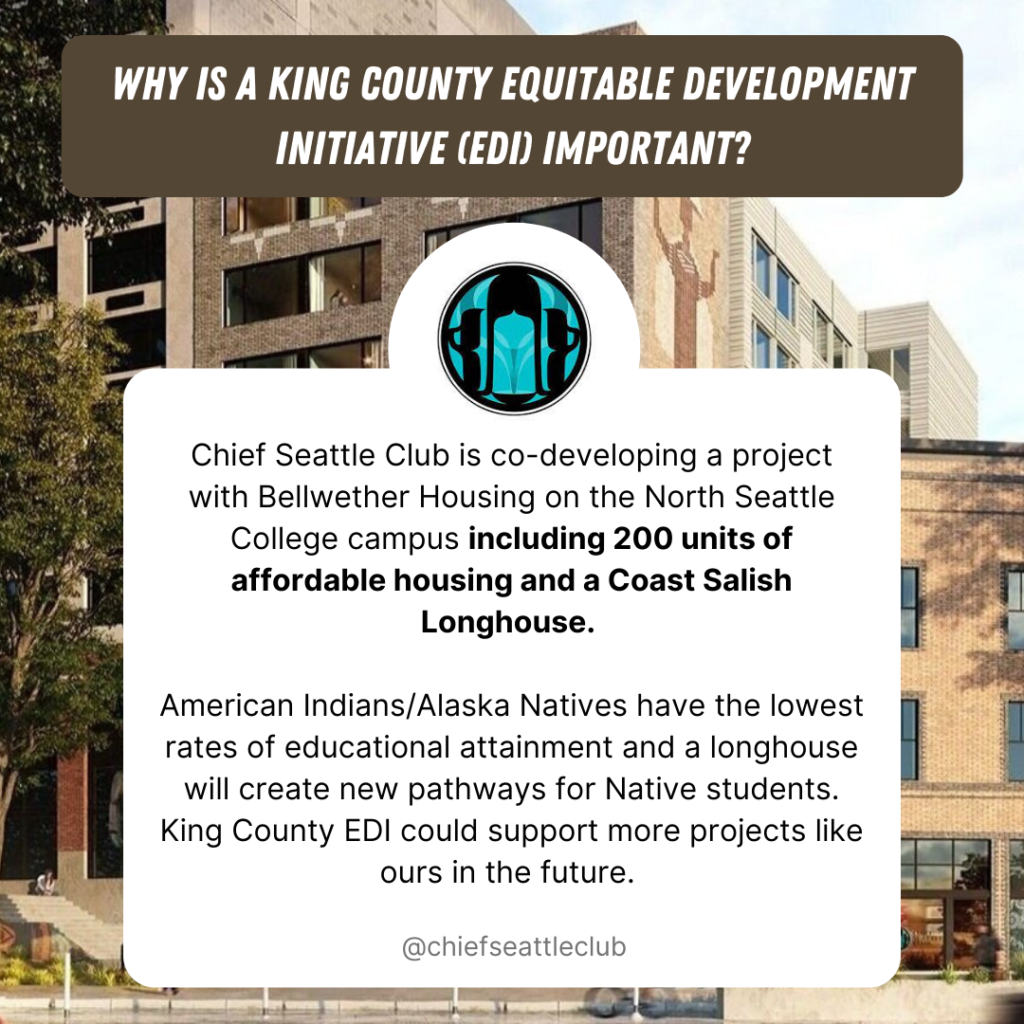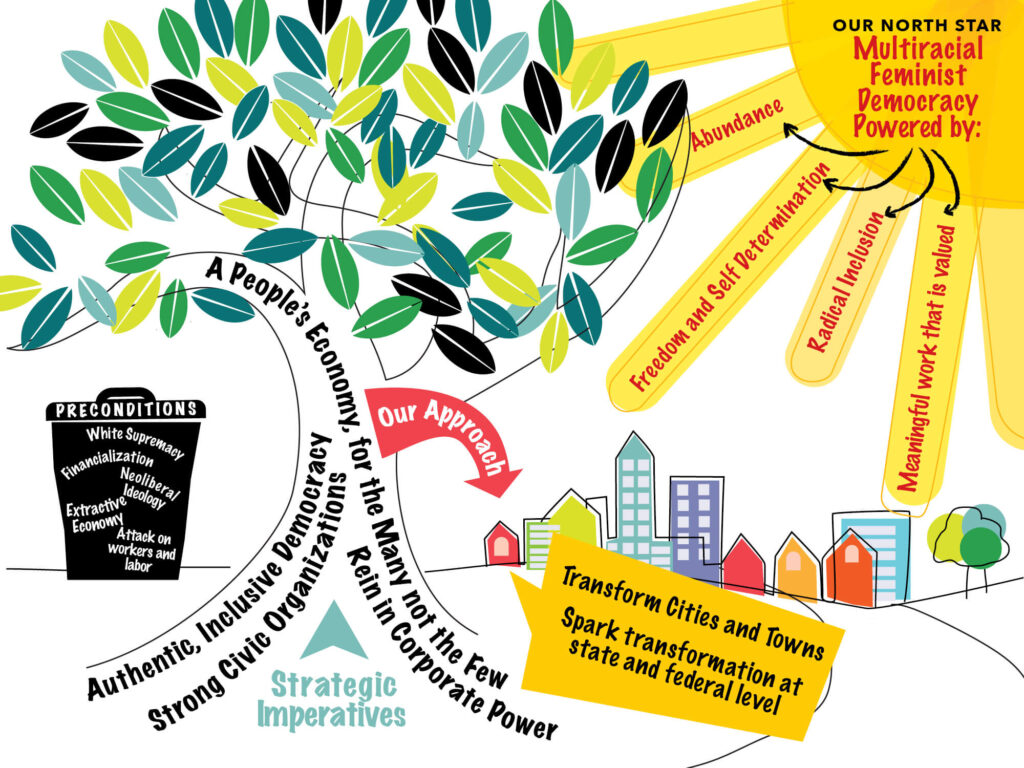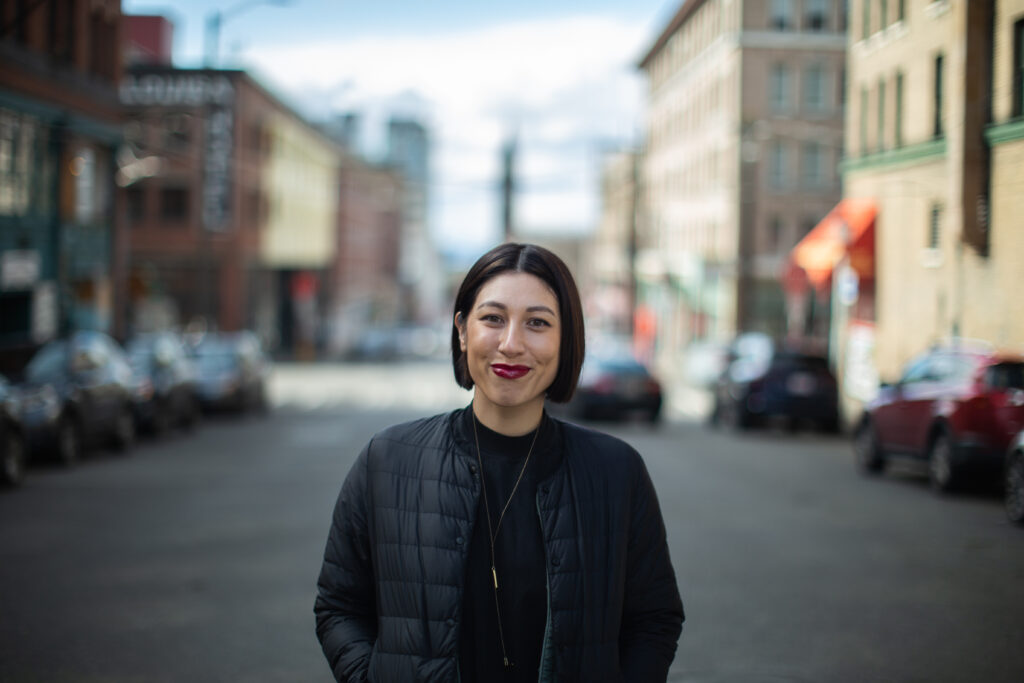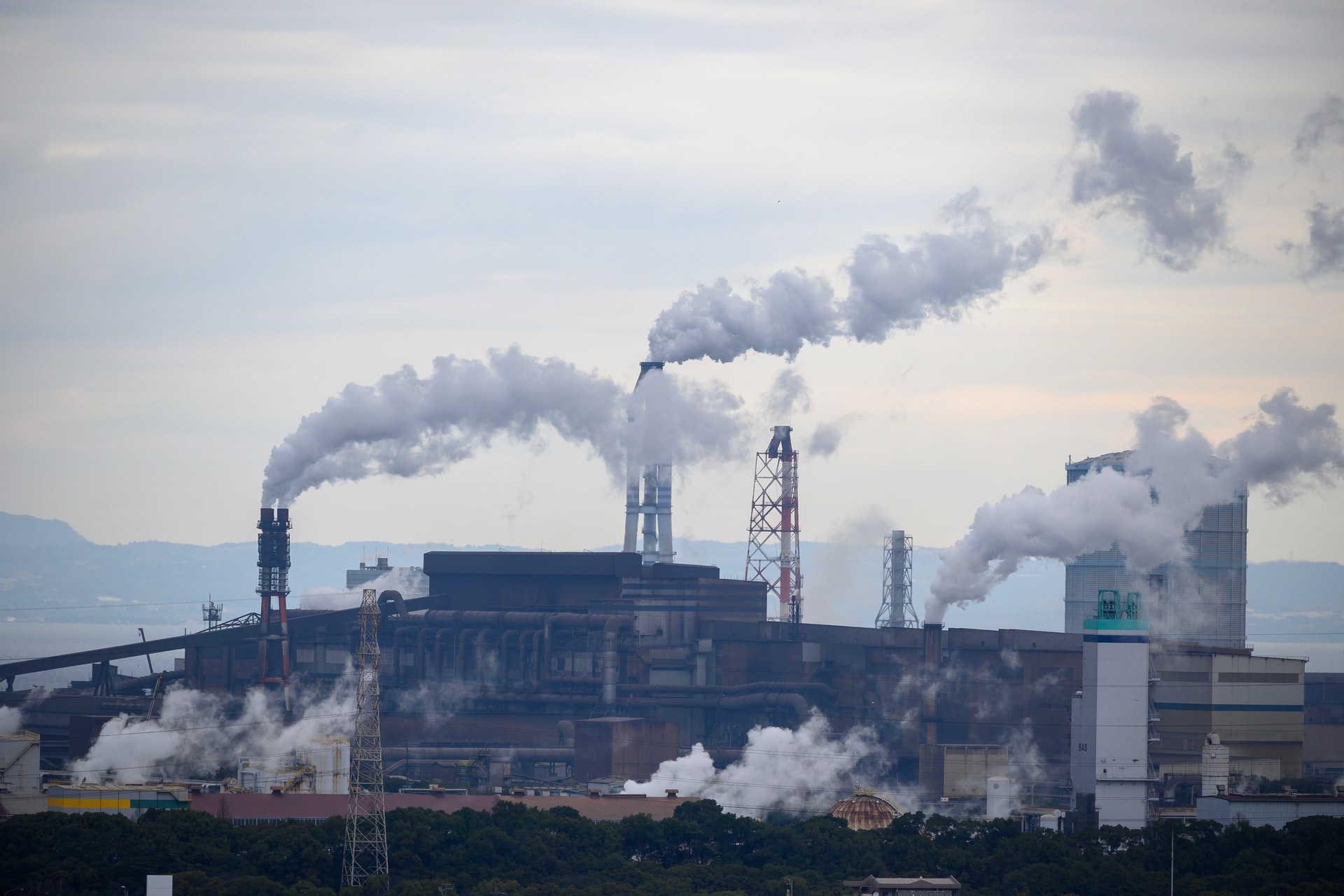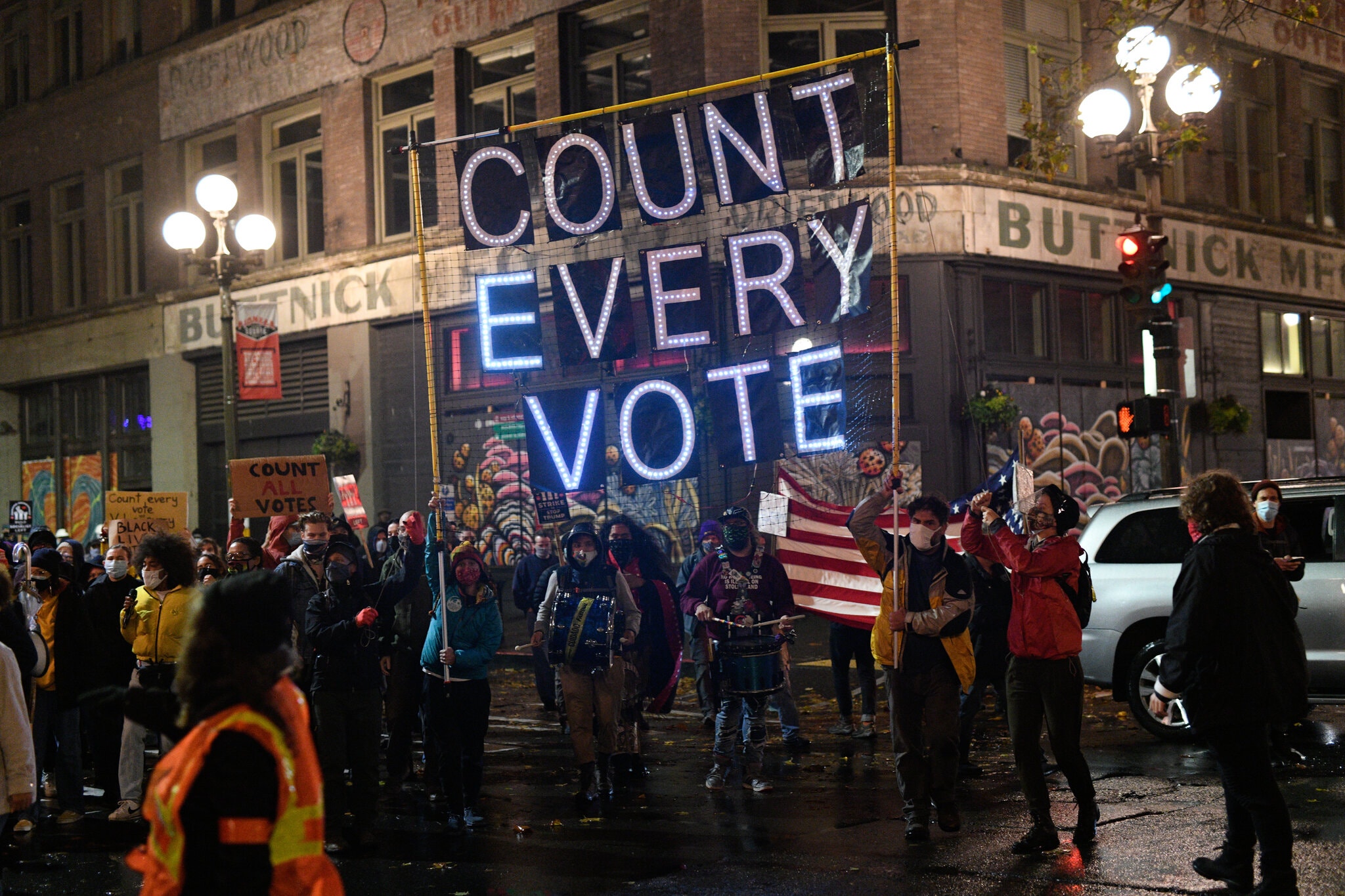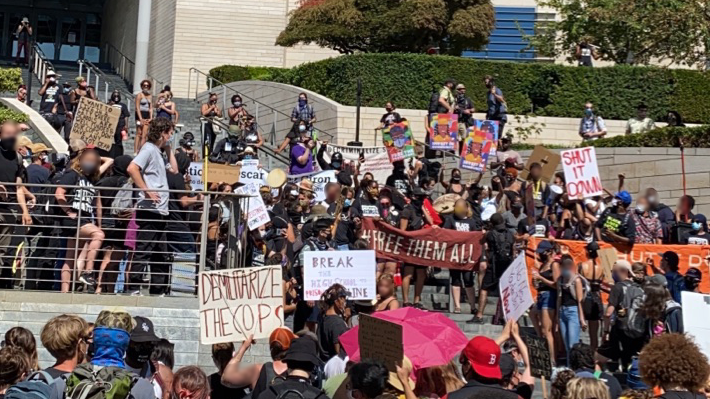published on 08/07/2020
Keep the pressure on Seattle City Council to #DefundSPD and invest in community!
Seattle City Council is expected to take its final vote on the 2020 budget rebalancing on Monday, August 10.
We need to keep the pressure on Council to follow-through with their commitments to defund the Seattle Police Department and reallocate the funds towards community safety solutions that keep everyone safe by advancing Black liberation.
Contact your councilmembers all through the weekend to meet the demands of our communities.
FIND YOUR DISTRICT AND COUNCILMEMBERS
Sample script for calling or emailing:
Dear Council Member [NAME],
I believe defunding the Seattle Police Department and reinvesting in community is necessary because [SHARE YOUR PERSONAL THOUGHTS/STORY].
Please meet the demand to defund SPD by 50% – $94 million – by voting to reinvest in community-based solutions to health and safety, eliminate and transfer SPD functions, and reduce SPD’s budget across the board.
Thank you,
[YOUR NAME, NEIGHBORHOOD, AFFILIATION/BUSINESS/ORGANIZATION]
Tag councilmembers on social media
Access the script and other sample texts here: tinyurl.com/defundtemplate
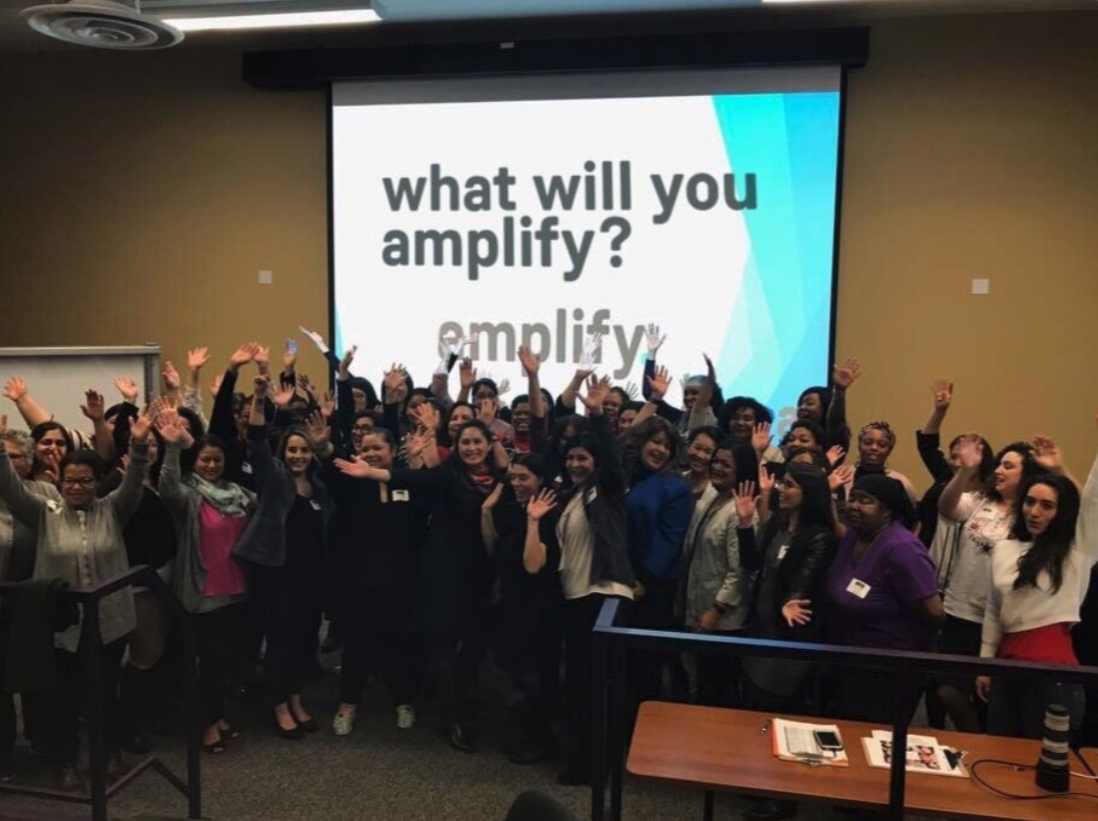
Sage Leaders – Puget Sound Sage’s new sister 501c4 organization – is up and running!
This past June, Sage Leaders opened! We are a 501c4 nonprofit organization affiliated with Puget Sound Sage. The mission of Sage Leaders is to advance equitable development, climate justice, and economic justice through research, advocacy, organizing, and leadership development programs.
With the creation of Sage Leaders, we are excited to welcome the Amplify program to the Sage family. Amplify is a leadership development program that supports progressive candidates, campaign workers, and elected officials, prioritizing BIPOC and LGBTQ community leaders. The vision of the Amplify program is to transform political culture by modeling alternatives to transactional, white supremacist, patriarchal culture, focusing instead on relational politics, co-governance, and supportive networks that build power for communities of color. Amplify’s peer support cohort model will bolster Sage’s leadership development programming, allowing us to build a powerful network of civic leaders of color in partnership with the Community Leadership Institute. Amplify was formerly a fiscally sponsored program at the Progress Alliance of Washington and we are thrilled to give it a permanent home at Puget Sound Sage and Sage Leaders.
This new infrastructure will enable us to increase our impact on racial and economic justice in our region. Stay tuned for more information in the coming months about the strategic direction of Sage Leaders, how its programs will complement Puget Sound Sage’s work and how you can get involved.
Follow Sage Leaders on Facebook or Instagram.
PROGRAM UPDATES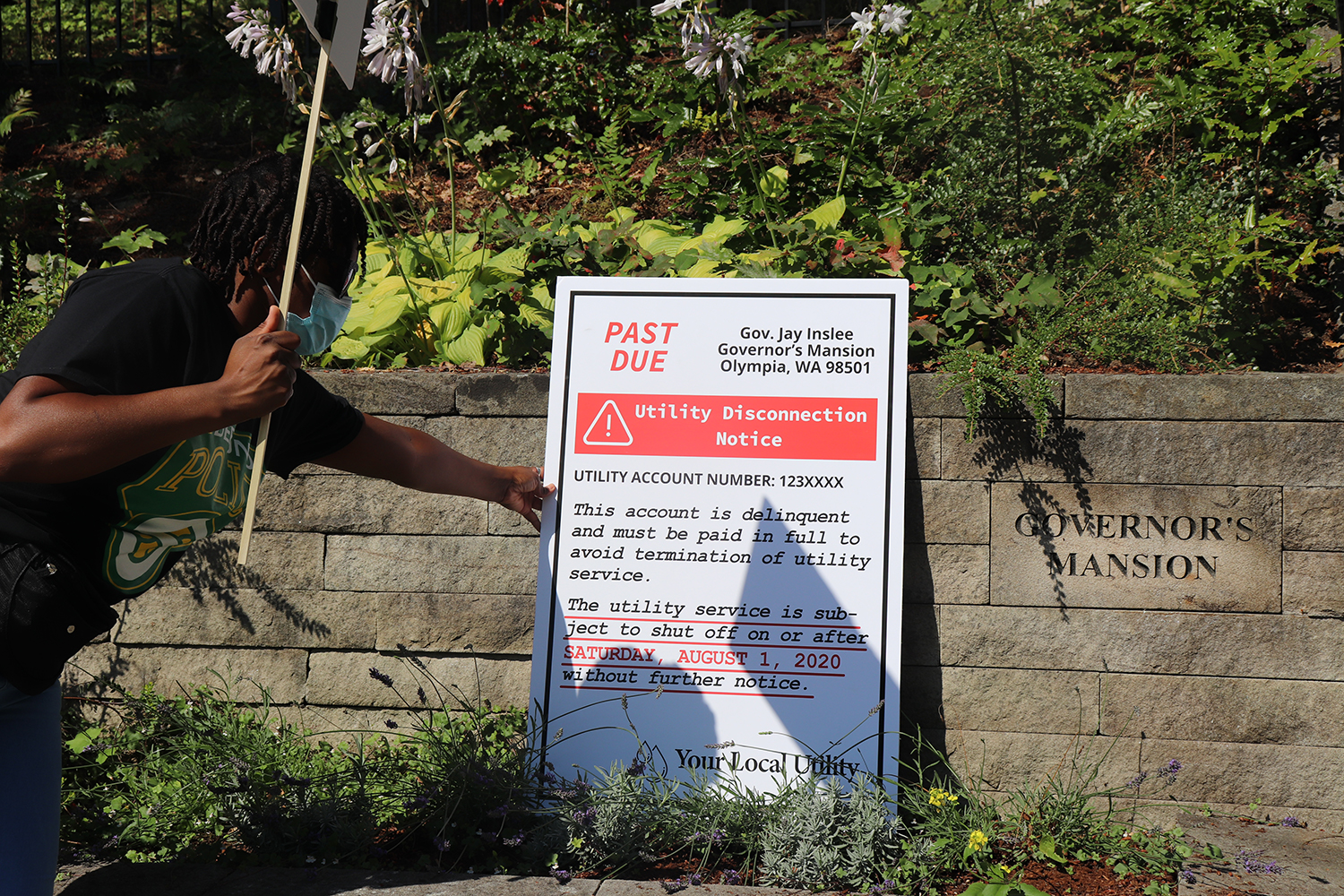
We delivered a utility shut-off notice to the Governor’s Mansion
On Thursday July 30th – two days before Governor Inslee’s moratorium on utility shut-offs was due to expire – Puget Sound Sage and Sierra Club took to Olympia to demand that the Governor keep households connected to basic utilities during the pandemic by extending the moratorium on utility shut-offs. The moratorium prohibits the disconnection of energy, water, and telecommunications utilities from Washington households due to non-payment.
Even before this pandemic struck, an estimated 15 million people in this country – especially low-income people and people of color – had difficulty affording utility services. 1 in 5 US households report reducing or forgoing necessities such as food and medicine to pay an energy bill. Prior to the pandemic, we found that when households in the South King County region were hit with a utility bill $50 higher than normal, they cut basic necessities like heating and cooling, rent/mortgage payments, food, medicine, and childcare/eldercare. Nationwide, utility bills are one of the top reasons that people take out predatory payday loans. Meanwhile, utility CEOs took home $1 billion between 2017 and 2019 and delivered hundreds of millions of dollars of profit to investors.
The day before the moratorium was set to expire on August 1st, Governor Inslee signed a proclamation to extend it until October 15.
For now, households won’t need to worry about making the impossible decision on whether to put food on the table or keep the lights on and the water running. But as the pandemic continues to surge around the country and the debt on utilities piles up, long term action needs to be taken to protect the communities that are already being disproportionately harmed by the crisis, as the economic fallout from COVID-19 is likely to last years.

JumpStart Tax passed with dedicated funding for the Equitable Development Initiative and the Green New Deal
Even before the tax on big businesses was introduced by Seattle’s City Council this summer, SouthCORE has been advocating for a progressive revenue model that will continuously fund equitable development in the city so communities and cultural institutions stay rooted in place amidst the ongoing public health and economic crisis.
SouthCORE continued to advocate for dedicated funding on the Equitable Development Initiative and the Green New Deal as the council passed the JumpStart bill and started deliberating on a spending plan of the revenue the tax will acquire. Through constant pressure by emails, calls, and public testimonies the JumpStart spending plan passed on July 20th with dedicated funding for the Equitable Development Initiative and the Green New Deal at $20 million each annually.
This is an especially huge victory as Seattle continues to grapple with the massive budget shortfall due to the COVID-19 pandemic, with budget cuts across all departments and funding for initiatives like the Green New Deal put on hold.
Because of the advocacy of our BIPOC partners including SouthCORE members, Got Green and Mazaska Talks, we are making sure our city puts community first – not only during the crisis, but in the years of economic recovery to come.
“Puget Sound Sage and SouthCORE has been especially important, and will continue to be my touchstone as we think about passing legislation that is equitable for communities of color.”
– part of Councilmember Tammy Morales’ closing comment on July 20th Full Council Vote
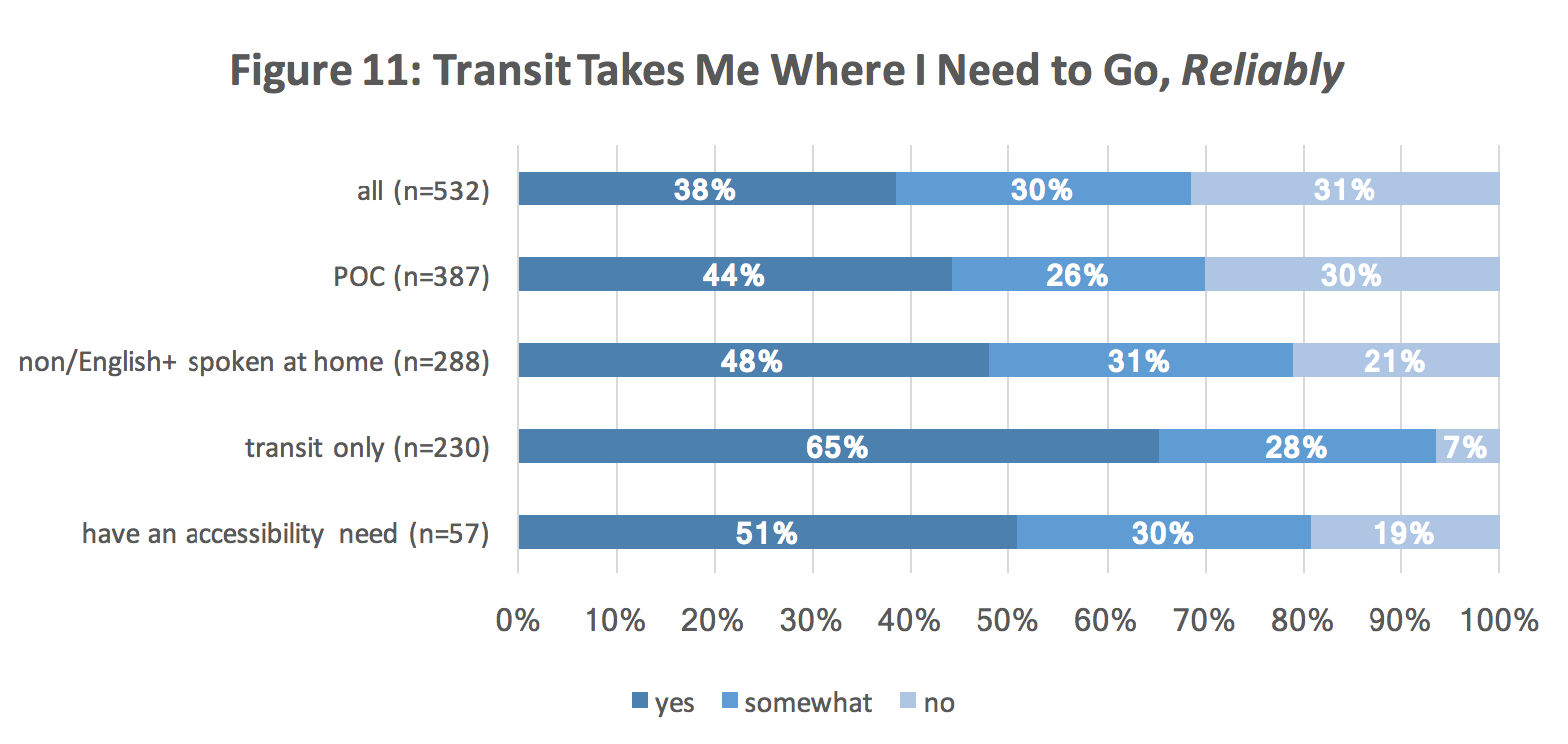
More Places, Better Connections: Transit Priorities for Residents of South Seattle and South King County
Through recent research conducted by Puget Sound Sage and Transportation Choices Coalition, we argue that the most effective way to maximize our public investment in transportation is to center racial equity and ensure that Black, Indigenous, and people of color, people with low-incomes, and people with disabilities are the most direct beneficiaries of these investments.
Our current public transit system does not meet the needs of these communities in our region. Often, transit planning focuses on maximizing ridership by connecting dense urban areas, where many people may already have other transportation options. In contrast to catering to riders with many options, centering mobility solutions for those with the greatest barriers to getting where they need to go, we’ll actually create a public transportation system that works for everyone.
Read the Report
STAFF UPDATES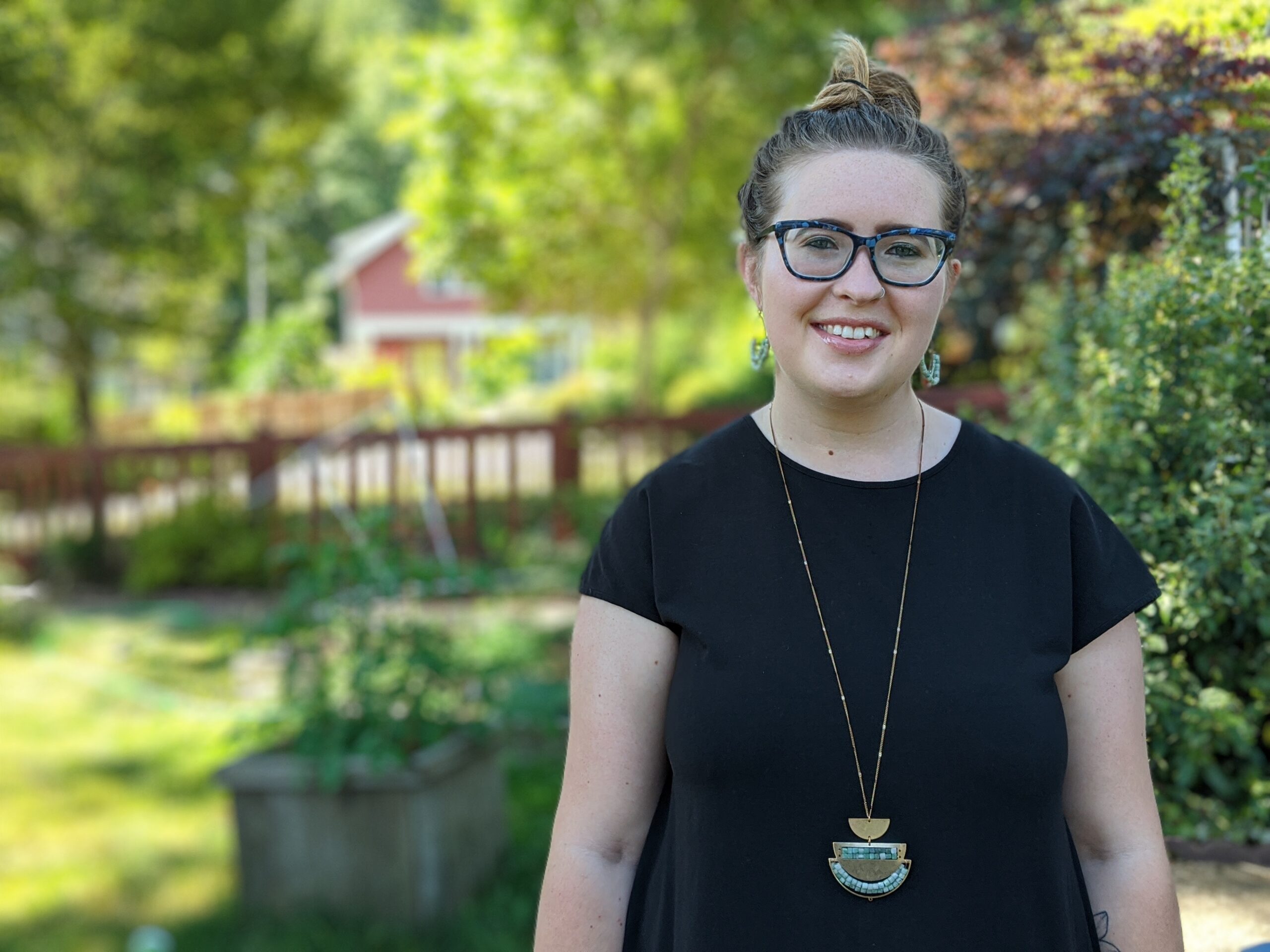
Sophia Hoffacker (she/her) started as Amplify Program Manager at Sage Leaders last month
Sophia has been organizing in environmental justice, anti-racist, and electoral spaces since 2011. Her passion for environmental justice stems from her childhood in eastern Michigan living just across the river from an oil refinery, and her passion for politics blossomed during her teenage years in Washington, DC. She moved to Seattle in 2016 two days after graduating from the University of Vermont with a B.A. in Environmental Studies, and has been working for progressive campaigns and nonprofits since then. Prior to her current role, Sophia worked on a state legislative campaign, did youth civic engagement organizing at the Washington Bus, and was a Regional Field Director for the Yes On I-1631 climate ballot initiative campaign.
In March 2019, Sophia was hired as Program Lead at Amplify, where she worked with Nicole Keenan-Lai and Tiffany Mendoza to shape and relaunch the Amplify program. At Amplify, Sophia coordinated a community accountability process to determine how their leadership development programs could best serve community needs, managed pilot leadership cohorts for candidates and campaign workers in down ballot races, and supported Amplify’s transition from a fiscally sponsored project to becoming a program of Puget Sound Sage and Sage Leaders.
Tell us a little about your role.
As Amplify Program Manager, I coach and convene a peer support cohort for campaign managers on progressive races across the state, prioritizing BIPOC and LGBTQ campaign workers. I also help to coordinate the First Mile project (a donor circle supporting candidates of color across WA), support programming for candidates and elected officials at the local level, and help guide Amplify’s long-term strategic planning. I am honored to be joining the Sage team and excited to support Sage’s work building community power and advancing community-centered policy solutions while unapologetically centering Black liberation, Indigenous sovereignty, and racial justice.
What might someone be surprised to know about you?
Some interesting jobs I’ve had in my life include: living and working on the land at an environmental education center in Appalachia, selling strollers and onesies at an upscale DC boutique frequented by the baby shower-attending political elite, leading boozy ghost tours through the haunted bars of downtown Seattle, doing voter registration at big music festivals, and staffing Jane Fonda while she knocked on voters’ doors for a campaign I worked on in North Seattle.
What is a piece of advice you have gotten over the years that has stuck with you?
“Our work moves at the speed of trust.” This is definitely an idea that I keep coming back to as I go through my own process of unlearning internalized white supremacy culture and learn to ground my social change work in authentic relationships and collective liberation, rather than urgency, transactional relationships, and quantity over quality.
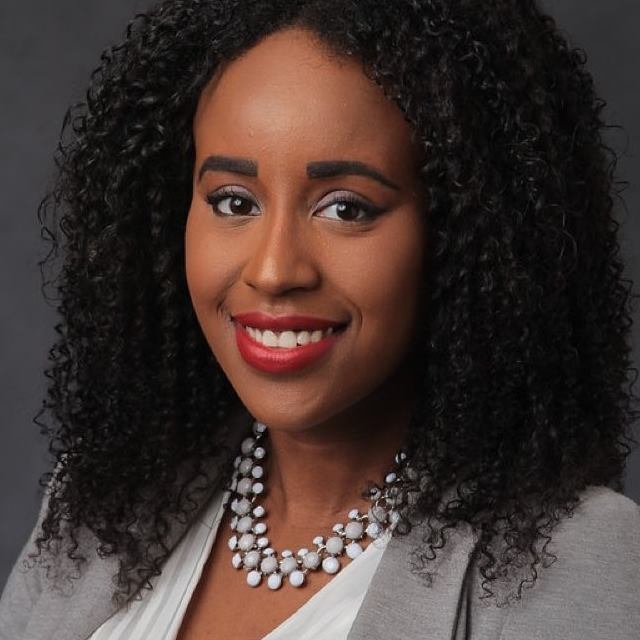
Bre Weider (she/her) started as Amplify Political Director at Sage Leaders this month
Bre Weider is a Seattle native who grew up volunteering on Election Day with her parents; her upbringing grounded her with a deep belief in social justice and progressive politics. Throughout college, Bre held numerous internships and worked for Organizing for America in 2012 as an organizer. Since her graduation, Bre has worked in both the Washington State Senate and House of Representatives, managed two campaigns, and worked as a Planned Parenthood organizer. Most recently, she worked as a Policy Analyst for Attorney General Bob Ferguson on the Hate Crimes Advisory Working Group. She also spends time serving on two PAC boards and volunteers with the local democratic party. Bre’s strengths are in community-based collaboration, political and data analysis, and communications.
Currently, Bre is pursuing her Masters of Public Administration at Seattle University, focusing on community and public safety in governance.
What are you most excited for in this role?
The opportunity to build political power in BIPOC and LGBTQIA+ communities spoke to me. I have had the opportunity to work in Washington state politics for over six years, and have seen firsthand how communities are systematically denied opportunities for representative democracy. I think this organization and role can help start to change the political process for the better.
What might someone be surprised to know about you?
I play golf. My dad is an avid player and bought me my first set of clubs when I was five years old. I don’t go to the range as much as I’d like but still try to hit the links when I can.
What’s a piece of advice you’ve gotten over the years that has stuck with you?
“Never limit the belief of what you think is possible.” When I first started my career, I felt so much imposter syndrome – there was no one who looked like me in those spaces. I got advice to not feel pressured to change myself or my beliefs to get ahead. It’s something that has always stuck with me.
IN THE NEWS
Gov. Inslee extends utility shutoff moratorium to Oct. 15
“What we’re hearing from our communities is that we are in crisis, and we need the government and leadership to step up to keep our communities safe and help us weather this storm. Right now, the pandemic is worse in Washington state than it was when we first had the moratorium put in place.”
– Katrina Peterson, Climate Justice Program Manager
Read the Article
For the Third Time, Groups Ask Inslee to Keep the Lights On
“It feels like a little bit of deja vu,” Ruth Sawyer with the Sierra Club said in a press conference on the front steps of the State Capitol building Thursday morning. “This is our third time asking the governor to extend the moratorium and we’re actually in a worse off place in terms of the pandemic than we were in the beginning.”
Read the Article
City council fuels Seattle’s Green New Deal with JumpStart tax
“Our focus was and will be for the Green New Deal to be guided by frontline communities. It’s an absolute necessity. Our vision is to have a fair and just Green New Deal.” – Debolina Banerjee, Climate Justice Policy Analyst
Read the Article



